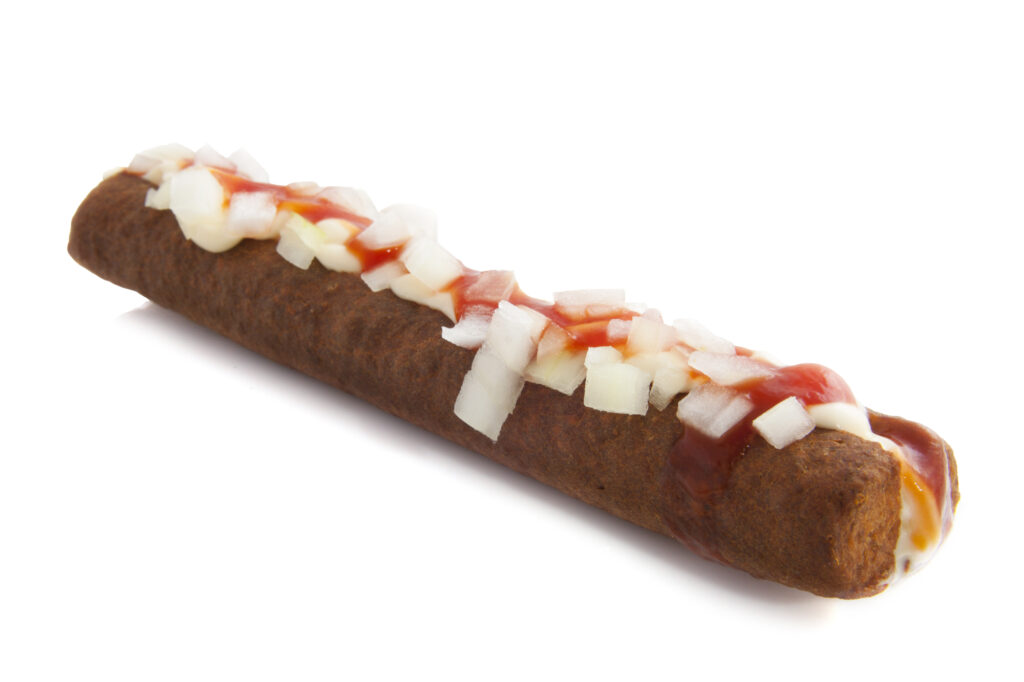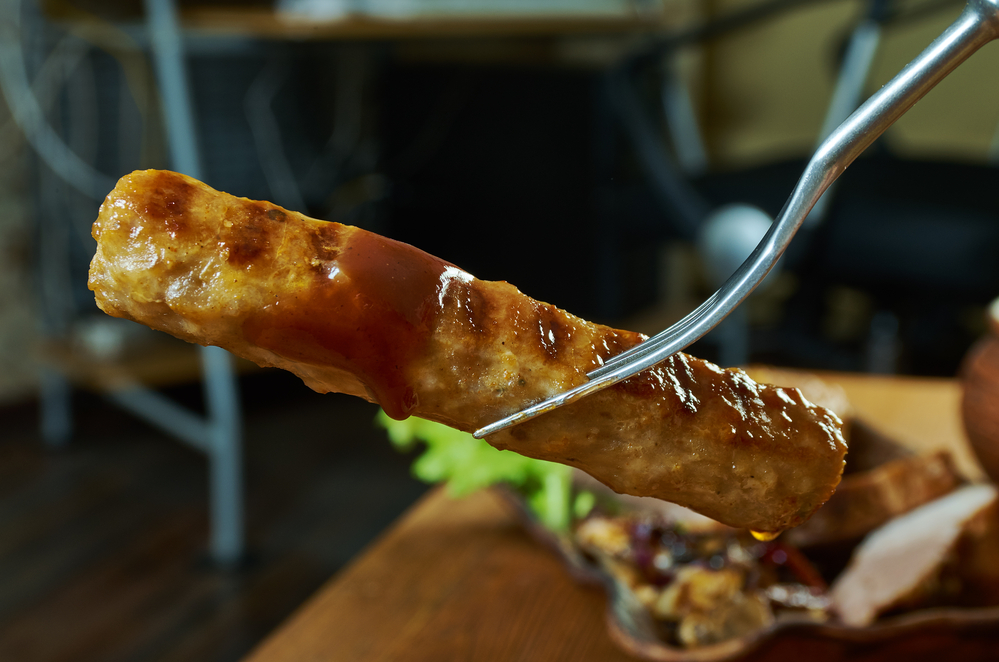The frikandel is perhaps the most contentious of Dutch foods. It’s both widely loved and widely hated, but what the frick is it?
Even the history of the frikandel is controversial. Some argue that it was invented in Dordrecht in 1954 by a man named Gerrit De Vries. De Vries’ frikandel was essentially a meatball — but long and cylindrical.
However, others claim it was invented in Deurne in 1958 by a man called Jan Bekkers, who would later coin the appetising word frikandel.
Regardless of who created the frikandel, the legacy lives on, and it has become a staple in Dutch cuisine, whether we like it or not.
So what is a frikandel?
The frikandel is a go-to snack in the Netherlands. Its natural habitat is typically a snackbar, like the nicely heated Febo vending machines or in the “to-go” section of a supermarket.
You could describe the frikandel as a long, cylindrical attempt at a meat stick. It’s classically encountered on its own or dressed up as a frikandelbroodje or a frikandel speciaal.
READ MORE | Dutch Quirk #32: Eat a lot of very questionable snack food
A frikandelbroodje is like a sausage roll with a bit of curry sauce in the pastry, and a frikandel speciaal is a bread roll with onions and curry sauce (We guess the onions make it special?)

This Dutch snack has a notorious reputation. That’s understandable, given that as soon as you ask the simple question, “What is it?” people already struggle to find the answer. Here are just a few reasons why some hesitate to take a bite. 👀
What’s in a frikandel?
The frikandel is essentially a long, skinless sausage or “a cylindrical, chewy, skinless, dark-coloured, sausage-like meat product” … delicious?! However, this doesn’t mean it consists purely of one specific meat. Indeed, you could say the frikandel is a hybrid meat product.
What meat you’re eating is never certain. All we can say is that it’s probably a bit of everything: the usual combination is pork, chicken, and beef, with chicken making up the highest proportion.

Many are understandably put off by claims that some manufacturers include horse meat and cow udders in the combination.🤢
However, apparently, horse meat is simply too expensive for the frikandel (what that means for the cow udders, though, is uncertain.) This has led to many people shunning the poor frikandel.
To add to the ambiguity, the meat used is mechanically separated meat (MSM), otherwise known as “white slime” — delicious. The creation of MSM involves the grinding up of carcasses from which most of the meat has already been removed.
So really, you could describe the frikandel as the Frankenstein of sausages.
READ MORE | What the frick?! The Netherlands is going through frikandel shortage
Luckily, if you’re craving a frikandel, you don’t have to subject yourself to the white slime! Recent years have seen the addition of vegetarian and vegan frikandel to the market. They’re typically made of soy protein and grains, and they taste just the same!
A Dutch treasure (whether they like it or not)
Any attempt to describe the frikandel in full sounds quite unappetising, so for now, let us just talk about how much of a Dutch treasure this snack has proven to be.
When asked, our readers responded with a variety of emotions toward this sausage. Whether you agree that the frikandel should be shunned or bowed to, its presence is undeniably popular in the Netherlands.
READ MORE | The Kapsalon: a simple dish with a multicultural twist
Statistics show that the Dutch hold frikandellen close to their heart, eating over 600 million per year. That means the average Dutchie is downing 35 frikandellen every 12 months.
I would like to clarify that my annual average was one back in 2018, and it has been less than one ever since. However, some colleagues have admitted that they may have managed to consume the annual average over long, boozy weekends in their youth.
The stats don’t lie, so even if the frikandel hasn’t infiltrated your taste buds, it has certainly infiltrated Dutch society. It’s even found in pop culture references; just check out this song!
Interesting toppings and variants of the frikandel
There have been many interesting attempts to alter the standard frikandel — either with toppings or by altering the frikandel’s composition altogether.
Some pairings were simply never going to work, such as the chocolate frikandel, the orange frikandel, and the beer frikandel. But some arose victorious from the lab.
Apple sauce
One reason why we are personally at odds with the frikandel is the fact that people think apple sauce (or appelmoes, as you Dutchies call it) is an acceptable addition.
While we could certainly dedicate an entire article to ranting about this, there are further offences that need to be discussed.
The Loempidel
For example, one can enjoy the loempidel, a mix between a frikandel and a loempia. A loempia is an Indonesian version of the Chinese spring roll. It’s larger and filled with more meat (no wonder the Dutch love it!)
In this case, the frikandel is wrapped in loempia pastry and filled with a sweet sauce.
Speciaal voor jullie: de recensie van de gloednieuwe loempidel. Dit is 2019 mensen. #snackspert https://t.co/wZniJC4EQ1 pic.twitter.com/JPFaTqGGQo
— Eke Bosman 🍔 (@EkeBosman) March 11, 2019
The frikandel XXL
If you simply can’t get enough of the frikandel, do not fret. The frikandel XXL may be perfect for you. Weighing in at 250g per serving, you certainly won’t go hungry. The only issue you may face is finding a sufficiently long broodje to go with it.
Pesto frikandel
If you’re a bit of a food snob and would never allow the frikandel speciaal in all its brightly coloured curry-sauced oniony-ness to pass your lips, then the pesto frikandel may be more to your liking.
This fancy number swaps out the curry sauce and onion for pesto mayonnaise with pine nuts and parmesan cheese. The frikandel is not only sustainable but can also be suitably gentrified.
And whatever this is…
A Dutch sport: Frikandel eating contest
There are many elements of Dutch culture that confuse us, but the one cultural phenomenon that has both disgusted and amazed us is that of the frikandel eating contest.
Competitors sit at a long table, shoulder to shoulder, and shove frikandelen into their mouths. It’s a serious sport (they have cheerleaders and all!), and while you may grimace throughout, you can understand why the endeavour attracts such an audience.
READ MORE | The Dutch food dream: 13 unmissable dishes in the Netherlands
Sjonnie Noordeinde from Delft holds the record for the most frikandellen eaten in an hour. He ate a staggering 47 of them in one hour!
If this seems like a relatively low number to you, we suggest you head out and try one. That rubbery, chewy texture doesn’t go down so quickly, does it?
Check out the video above. Even if you don’t find the idea strangely entertaining, watch it for educational purposes. It’s really quite an anthropological study.
Oh, the frikandel, we really don’t know how to feel about it. What do you think? Let us know in the comments below.





Actually the video is shot in Belgium, during the Belgian Championships and the discodel is on a picture from a Belgian snackbar too.
My son always called them a frikanhel, like “what the frickin’ hell are those made of?”
Please learn proper Dutch spelling, if you’re going to use Dutch words. The plural of frikandel is frikandellen (double l). It would have been the simplest thing in the world to look that up before running this piece.
Dear Ariane, well spotted! Thanks for pointing it out, we’ve fixed it 🙂
Many, many years ago, my sister, who lived on the Dutch/German border, used to send us Dutch frikandel sausages which were absolutely delicious. Since she returned I have been denied this culinary delight. The nearest I can now find are German frikadellen from ALDI but I still crave the Dutch sausages. Is there anywhere that I can buy them in England?
Sid
There is a multinational shop on the lower High Street in Lincoln, about 400 metres from Wetherspoons that sells boxes of 40. They cost around £5.00 for a box.
When we came back from West Germany (ex-RAF) in 1983, there was a butchers on the Forum in North Hykeham that sold boxes of 40 for about £8.00 but were made in the UK for export to Netherlands and Belgium. Unfortunately that butchers has long gone and I cannot remember the name of the manufacturer.
I have also purchased them from Brake Brothers, but that was also many years ago.
A frikandel speciaal is a normal frikandel sliced almost in two with both mayonaise and ketchup in the wedge with some raw union pieces on top.
I don’t like them. Ate one years ago and never got near another since!